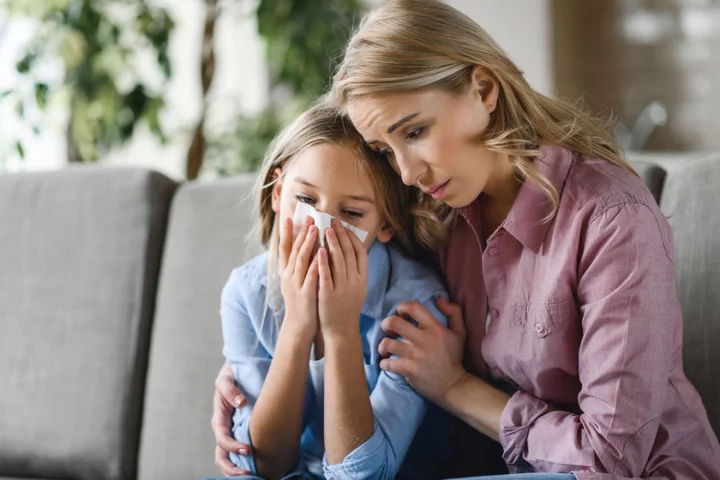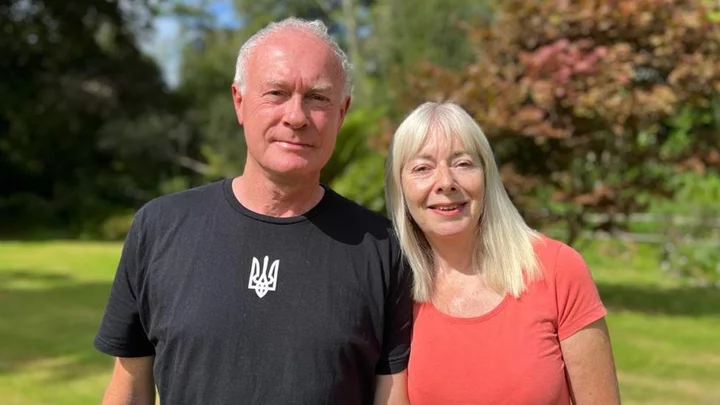
Elle Fanning makes Alexander McQueen campaign debut to promote Joan of Arc-inspired range
In a new range inspired by France’s patron saint, Elle Fanning has made her debut fronting an Alexander McQueen collection, alongside Naomi Campbell, Liu Wen and Eva Green.
2023-08-25 19:15

New FanDuel NFL Promo Gives $200 GUARANTEED Bonus + $100 Off NFL Sunday Ticket!
FanDuel is giving new users a $200 guaranteed bonus plus $100 off NFL Sunday Ticket on any bet! Find out how to claim this offer here.
2023-08-25 18:26

Fukushima: The fishy business of China's outrage over Japan's release
In China, there is alarm over the nuclear plant's water but its seafood ban isn't rooted in science.
2023-08-25 17:59

Curls feeling frazzled? 6 ways to repair summer hair damage
Holidays and hot weather are brilliant for raising your spirits during summer, but they can wreak havoc on your hair – especially if it’s wavy, coiled, kinked or curly. Sun, sea and swimming pools – or all of the above – can leave your crowning glory looking frizzy and lacklustre by the time September rolls around. “Curly hair can be more fragile than straight hair because the cuticle layer remains more raised than it is on straight hair, which leaves it more vulnerable to breakage,” says Kevin Hughes, global artistic director at Moroccanoil. Plus, if your strands aren’t healthy and hydrated it’s harder to get that gorgeously glossy, defined look, because curly hair naturally tends to be less shiny. “When there are twists and turns in the hair shaft, it absorbs parts of that reflection, reducing some of the shine that we see,” Hughes explains. “This dullness is increased if the hair is damaged or distressed by UV rays, sea and environmental aggressors.” But it doesn’t have to be that way. Here are six expert-approved ways to rejuvenate curly hair… 1. Soothe your scalp “Curly hair has less moisture than straight hair because the oil from the scalp cannot move down the strands of hair as easily,” says Hughes. This problem can be exacerbated in summer if you’ve been sunbathing without a hat. “Occasionally I see dry or damaged scalp on clients who have braids and textured styles, as it is more exposed to the sun and subject to sunburn,” he says. Just as you would apply aftersun to parched skin and keep it covered, treat your scalp to a moisturising serum or mask and leave it on overnight. “I would be sure to use some aloe vera, apply to your scalp and wash less often to allow the natural oils to replenish and balance the scalp,” says Hughes. 2. Detangle knots “Healthy curls and coils are well-defined, springy and bouncy – lack of definition and tangles could indicate damage,” says Jennie Roberts, afro hair Expert at SheaMoisture UK. She recommends regularly detangling to “prevent knots and tangles from forming, which can lead to breakage. Use a brush or comb designed for curly and/or coily hair to avoid damaging the curls, kinks and coils”. Hughes suggests applying conditioner to wet hair before you wash it as an extra detangling step: “The conditioner will break down what is in the hair and rinse away with the conditioner, so the shampoo won’t make it worse than it already is.” 3. Bring back the bounce “Gently stretching a strand of hair should result in some level of elasticity without immediate snapping,” says Roberts. “If your hair breaks easily without any flexibility, it might be damaged.” From shampoo to styling, hydrating products are key for repairing your locks, says Hughes: “Look for ingredients that moisturise the hair, like panthenol and jojoba, as well as strengthening ingredients, like vegetable proteins.” Roberts adds: “Consider using a deep conditioning treatment at least once a week to maintain moisture levels.” 4. Avoid heat and chemicals “Minimise the use of heat-styling tools like blow dryers and straighteners, as they can cause further damage, especially in humid conditions,” says Roberts. Always use a heat protection spray, and if you’re planning a summer escape, try to resist the urge to book salon appointments for anything other than a trim. “Wait until you get home from holidays before you have any chemical treatments such as colouring, perming, or relaxing,” Roberts says. “As you’ll be able to assess the condition of your hair better – the heat and weather will just add to the damage.” 5. Revive your curls While it may be tempting to reach for a heat styling wand when you want to zhoozh up your curls, if you want to protect your locks, it’s better to use a gentle hair routine during the summer months. Starting with freshly washed hair, Hughes says: “Make sure to blot it dry with a towel, meaning don’t be rough with it, then spritz through a heat protection spray – this will be the last time you comb through your hair.” Next, he says: “Scrunch the hair from the ends up to the scalp with the palm of your hand, then use a diffuser to dry the hair – essential to keep from blowing the curls around and getting frizzy.” If you do have any frizzy areas, use a heat styler sparingly: “Use a curling iron the same size as your curl; pick up random pieces of hair and redefine the curl with the iron.” 6. Lightweight styling products “Choose lightweight products to prevent buildup and to avoid weighing down your curls in the humid weather,” says Roberts. “Hair butters and creams will melt, so water-based products are always advised.” This is particularly important for the final step in your styling routine. “Use a curl-enhancing styling product,” says Hughes, such as a mousse or cream, to scrunch and set your locks. “Don’t brush or comb through your curls after hair is dry.” Charles Worthington Moisture Seal Leave-In Conditioner, £8.99, Superdrug SheaMoisture Strengthen & Restore Hair Treatment Masque, £12.99, Boots Osmo Curl Revival Replenishing Cream, £10.99, Sally Beauty Briogeo Curl Charisma Rice Amino and Quinoa Frizz Control Gel, £21, Cult Beauty Moroccanoil Curl Defining Cream, £26.85
2023-08-25 17:28

ABBA star Agnetha Fältskog making solo comeback with first album in a decade
Agnetha Fältskog has a new solo album on the way and has signed to BMG.
2023-08-25 17:15

4 hacks to get teens off the sofa and get active – as study warns of heart damage
The amount of screen time teenagers get is a worry to lots of parents. And, it turns out, the health impacts of being inside and staring at a screen for long periods of time can have a serious impact on a young person’s physical health later in life. According to new research, parents should limit the amount of time children spend on social media and video games after a study found inactive teenagers are more likely to have signs of heart damage as young adults. A child may appear healthy but, even children who have a normal weight were still at risk, the study of 766 British youngsters found, after tracking them for 13 years. Academics involved in the research, which is to be published at the ESC Congress in Amsterdam, said that this heart damage could be setting the stage for heart attacks and strokes in later life. So, how can we get teens up, away from their phones and out of the house? 1. Encourage them to destress Teens may take to their screens to distract themselves from day-to-day life, watch TikToks, or aimlessly scroll – which they may see this as a form of relaxation. It might be helpful to frame exercise in the same way for stressed teens. “Young people today are facing many stress factors in their daily lives and exercise can be an important mechanism to cope and overcome such difficulties,” says Dr Triveni Joshi, consultant child and adolescent psychiatrist for Cygnet Health Care. Reiterate the benefits of exercise for their mental wellbeing too. “When you exercise, your body produces dopamine and endorphins in your brain that help you to feel good. Exercise can have a direct impact on improving mental health by reducing anxiety, depression and low mood,” she says. “Plus, exercise can give you a real sense of accomplishment and pride at having achieved a goal, thereby improving self-esteem and confidence.” Celebrate the accomplishment of just getting out and being healthy for positive reinforcement. 2. Suggest things that interest them “There is always an activity that can suit somebody,” says Joshi.”There is a range of opportunities for physical activity such as gardening, walking groups, Zumba, dancing, pilates, or swimming.” Sports like weightlifting and running are big on social media and “can improve confidence levels and tackle low self-esteem.” While being on social media may stop them from getting out, pointing towards creators who promote a healthier lifestyle may help them in the long run. Perhaps they can pair their on-screen interests and favourite creators with physical experiences. “Exercise should always be fun so often it is about finding where their interests lie and incorporating that into a healthy regime,” Joshi explains. 3. Talk to them about why they don’t want to exercise There may be a reason why your teen isn’t eager to get up and about you don’t know about, and having an open discussion may help them feel more comfortable, and build a closer bond with you. “With other pressures in their lives they may feel tired and lack the motivation to get active,” Joshi says. “A lot can depend on personality type too. Introverted children may feel shy, embarrassed, or too concerned about judgements to take part in physical activity. It might not pique their interest or they may feel it is something they aren’t skilful at and therefore don’t have the motivation for fear of not being good at something.” Getting to the bottom of why they won’t exercise may help them feel more empowered to do so, particularly if you can relate to one another and take on this challenge together. 4. Set a good example So much of our relationship with exercise is rooted in our childhood, so try to “encourage children to be active by setting the right example and being active yourself”, says Joshi. If you complain about exercise and are on your screen all the time, it sends the message that it’s normal. In trying to set a good example, you may find something you love to do together, like a specific yoga class, workout or weekly ParkRun. Read More Former royal chef explains why Prince William and Kate’s children don’t eat with them ‘You think it’s going to be a money making machine’: How modern life killed the hobby High infidelity: why do people have affairs? Why are wellbeing experts concerned about the ‘lazy girl job’ trend? Almost half of parents have ‘no idea’ how people raised children before smartphones ‘Overwhelmed’ Jennifer Lopez celebrates one-year anniversary to Ben Affleck
2023-08-25 16:24

How to protect your kids and yourself from back-to-school colds
While your child may be excited about returning to school this September, there’s also a little anxiety about the one thing that can put a spanner in the works: a cold. As Dr Dave Nichols, of MyHealthChecked, an at-home wellness testing company, puts it: “The return to school following the summer holidays often coincides with a rise in a number of respiratory illnesses, including the common cold.” Common symptoms include a cough, sore throat, nasal irritation, nasal discharge (rhinorrhoea), a fever or generalised malaise, explains Nichols. “While the common cold can affect all population groups, the National Institute for Health and Care Excellence report this to be far higher amongst children, who experience an average of five to eight colds per year.” Nichols continues: “Adults who have regular contact with children are also seen to have colds more frequently.” He says children are especially important in the transmission, acting as reservoirs for the infection as they have fewer antibodies and a more immature immune system, making them more susceptible to the common cold. “Direct contact with the skin or hand contact with an infected object are key ways the virus is transmitted,” notes Nichols. “Which explains why numbers seen amongst children are higher, as they are more likely to have close contact with each other in nursery and school.” While there is no cure for the common cold, he says prevention remains crucial in order to protect ourselves from illness. Here are some top tips to reduce the chances of catching a cold… Adopt good hygiene measures Basic good hygiene measures are an important way of reducing the transmission of viruses, says Nichols. Wash hands frequently with warm soap and water if you (or the kids) have symptoms, or have come into close contact with someone who has symptoms. He says to avoid sharing items within households, such as towels, can also help. Get into a physical exercise routine Ensuring regular physical exercise is important because it has been shown to reduce the chances of people developing viral illnesses such as the common cold, advises Nichols. “Exercise plays an important role in boosting immunity by increasing the circulation of some important immune cells, which fight against infection,” says Nichols. “It also plays a key role in helping to reduce stress and the release of stress-related hormones within the body, which has an important impact.” Eat healthy foods to maximise your wellbeing “Eating well will help support a good functioning immune system,” says Dr Emeka Okorocha, medical doctor and TV personality. “The body needs a range of nutrients and vitamins to stay strong and healthy, and prevent the development of disease.” He highlights the following vitamins… “Vitamin A, which is converted from beta carotene found in vegetables such as sweet potatoes and beetroots, is very good for helping support the mucosal lining in your nose and lungs – and helps defend against infection. “Vitamin C has always been considered a good preventative vitamin from catching colds, this can be found naturally in fruits like strawberries, blueberries, blackberries and raspberries – and in leafy vegetables like spinach as well as broccoli, peppers and peas. “Vitamin D that many of us get from natural sunlight is also ideal for overall health – and studies have shown that people lacking in vitamin D are more likely to succumb to infection.” In winter months, when there are lower levels of natural sunlight, he says you can obtain vitamin D from foods such as salmon, mackerel, eggs, and mushrooms. Berries are very beneficial Okorocha continues: “I love fresh berries – strawberries, raspberries and blueberries, for example, are high in antioxidants and contain lots of vitamin C, which helps our bodies to produce antibodies that keep us from getting sick. “Berries are also high in flavonoids which help protect cells in our immune system by promoting activation and secretory processes within cells.” He says studies have indicated that regularly eating fruits such as blueberries may decrease your likelihood of catching a cold. Get adequate rest and sleep Ensuring you’re getting adequate amounts of rest and sleep is crucial in helping to reduce your risk of becoming unwell, urges Nichols. “A healthy adult needs between seven to nine hours of sleep per night, with children requiring longer,” says Nichols. “Sleep quality has been shown to be an important predictor of immunity, with those regularly sleeping under the recommended amounts more likely to develop a cold. “Improving your sleeping pattern is therefore an important way to reduce the chances of becoming unwell.” Read More Former royal chef explains why Prince William and Kate’s children don’t eat with them ‘You think it’s going to be a money making machine’: How modern life killed the hobby People defend bride after father-in-law explains why he left wedding early 4 hacks to get teens off the sofa and get active – as study warns of heart damage Elle King opens up about her ‘deep depression’ amid two-year postpartum journey BBC Radio 2’s Tony Blackburn reveals he had sepsis and pneumonia in health update
2023-08-25 15:52

EXCLUSIVE: Claire Richards teases future plans for Steps: ‘We’re always talking!’
Claire Richards is “always talking” with her Steps bandmates about what to do next after the 1990s favourites enjoyed an incredible resurgence in 2017 as she steps out on her own to release her second studio album.
2023-08-25 15:28

Ukraine aid worker Chris Parry's parents go on aid mission there
The Parry's will visit the war-hit country to deliver further aid in their son's name.
2023-08-25 12:56

São Paulo's micro-houses keeping homeless families off the streets
The city of São Paulo has come up with a new idea to try to solve its housing crisis.
2023-08-25 08:59

EU safety laws start to bite for TikTok, Instagram and others
Nineteen large platforms have to start complying with new rules as soon as Friday or risk big fines.
2023-08-25 07:29

Hundreds of Wells Fargo users report issues with banking system
More than 700 users reported issues with Wells Fargo's banking system Thursday, according to Downdetector, with problems ranging from transferring funds to declining ATM cards.
2023-08-25 06:55
